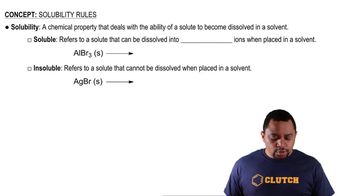Solubility Rules definitions Flashcards
 Back
BackSolubility Rules definitions
1/15
Terms in this set (15)
- SolubilityA chemical property indicating a solute's ability to dissolve in a solvent, forming a solution.
- SolubleDescribes a solute that dissolves in a solvent, forming aqueous ions.
- InsolubleDescribes a solute that does not dissolve in a solvent, remaining intact.
- Aqueous IonAn ion surrounded by water molecules, indicating it is dissolved in water.
- PrecipitateA solid formed from a solution when a solute is insoluble in the solvent.
- Group 1A ElementsElements like hydrogen, lithium, sodium, and potassium, always forming soluble compounds.
- Acetate IonAn ion that, when part of a compound, ensures the compound is soluble.
- Nitrate IonAn ion that guarantees solubility of the compound it is part of.
- Ammonium IonAn ion that makes any compound it is part of soluble.
- Chlorate IonAn ion that, along with perchlorate, ensures compound solubility.
- SulfateGenerally soluble, except when paired with ions like calcium, barium, or lead.
- HalogensGroup 7A elements, soluble unless paired with mercury, silver, or lead.
- Carbonate IonAn ion that forms insoluble compounds unless exceptions apply.
- OxideAn ion that forms insoluble compounds, except with calcium, barium, or strontium.
- Phosphate IonAn ion that typically forms insoluble compounds without exceptions.



